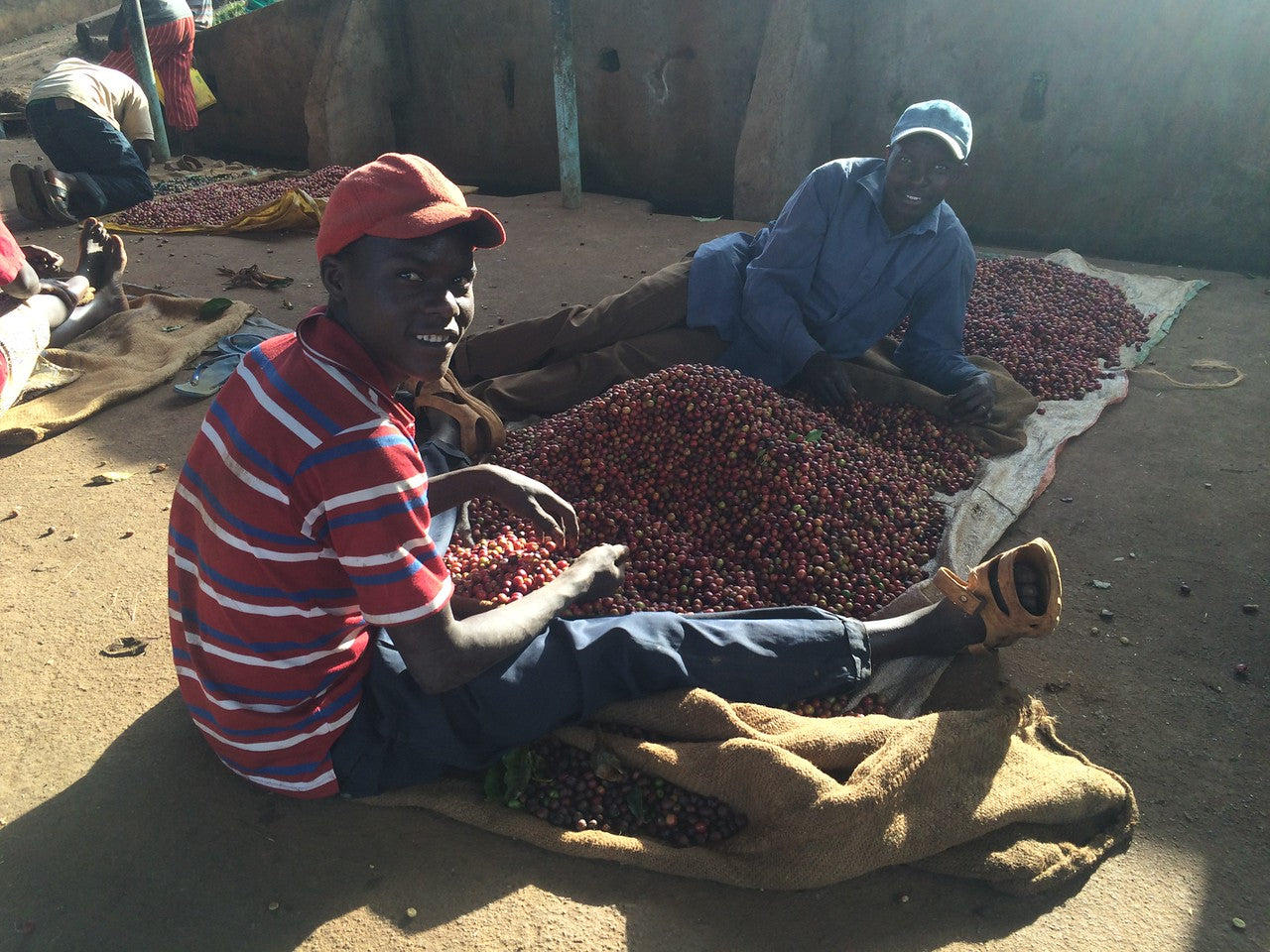
AA THIMU / KENYA
AA Thimu / Kenya
Flavor Profile :
Black currant, Plum, Brown sugar.
Origin: Kenya
Factory : Thimu Coffee Factory
Cooperative : Baragwi Farmers Cooperative Society
Producers: 3000 members
Region : Kirinyaga
Varietal : SL28, SL34, Ruiru 11 and Batian
Process : Washed
Altitude : 1600 - 1800masl
Harvest : 2022
The Farmers Cooperative Society is referred to as FCS.
This coffee has a strong acidity reminiscent of blackcurrant or plum, as well as a gentle, sweet aftertaste like dissolved brown sugar. Its rich body and intense fruity flavor embody the taste we expect from Kenya.


The Kirinyaga region is a prominent coffee-producing area in Kenya, extending to the eastern part of Nyeri, where high-quality coffee is also produced. The Kirinyaga region is known for its rich and complex cup profiles, offering a wide range of outstanding flavors. It takes about 2 to 3 hours by car from Nairobi to reach this region. Many renowned coffee-producing areas in Kenya are located north of the capital city, Nairobi.
AA Thimu is produced at the Thimu Coffee Factory operated by the Baragwi Farmers' Cooperative Society (FCS) in Kirinyaga. The lot name includes the name of the factory where the processing takes place. Baragwi FCS is the largest FCS in Kenya and operates 12 washing stations. It has over 15,000 members, with approximately 3,000 small-scale producers participating in the Thimu Coffee Factory. The FCS was established in October 1953 with the aim of enabling its members to gain social and economic benefits through coffee cultivation. The cooperative employs over 140 staff, with 31 of them being women.
The FCS is a non-profit organization operated by the farmers themselves, and it conducts coffee sales on behalf of the producers. The cooperative provides various support to its members, including technical advice on field agricultural practices such as weed control, pruning, fertilizer application, and thinning. It also offers loans for purchasing necessary inputs like seeds, fertilizers, and pesticides to improve productivity. The cooperative's operations are overseen by a chairman elected by the members, along with a board of appointed members. Each factory operated by the cooperative also has a manager appointed to oversee operations such as quality improvement and staff management.


During the harvest season, farmers pick the cherries at their farms or homes manually and transport them to the factory or collection points. Upon arrival at the delivery location, the farmers open the bags containing the cherries on the ground (usually on top of a cover) and manually sort them, removing any underripe, overripe, or diseased cherries. While the sorting is done by the farmers themselves, factory members may be present to ensure proper sorting is being carried out.
The factory manager inspects the quality of the cherries and checks them before they are weighed. Based on the quality and quantity of the delivered cherries, farmers receive an advance payment as part of their compensation. During the advance payment, delivery information from each farmer is recorded, and a receipt for the advance payment is issued. Using this receipt, the farmers receive the remaining payment after the coffee is sold.
After being weighed, the cherries are fed into a pulper, a machine used to remove the pulp from the cherries. Through the pulping process, the cherries flow with water, leaving behind parchment as the pulp is removed.
Once the pulping removes the skin, the coffee undergoes dry fermentation in painted concrete tanks for 18-36 hours. In many factories, water is added every 6-8 hours to agitate the parchment and facilitate drainage.
After fermentation is complete and the mucilage is dissolved, the parchment is washed in washing channels and again sorted by density. In this process, the densest beans sink in the water channels and are directed to a tank filled with clean water as P1 (Parchment 1), while semi-dense beans are directed to another tank as P2. Floating materials, known as P3, are considered of lower quality and are typically sent directly to drying tables.
Afterward, the coffee beans are skin-dried on mesh mats made of jute for a day. Once a day has passed, the coffee beans are transferred to traditional drying tables known as African beds.
Typically, the coffee beans are dried on a surface that consists of wire mesh with jute fabric or shade netting. The drying time varies depending on the weather conditions and precipitation, usually taking around 12 to 20 days.




